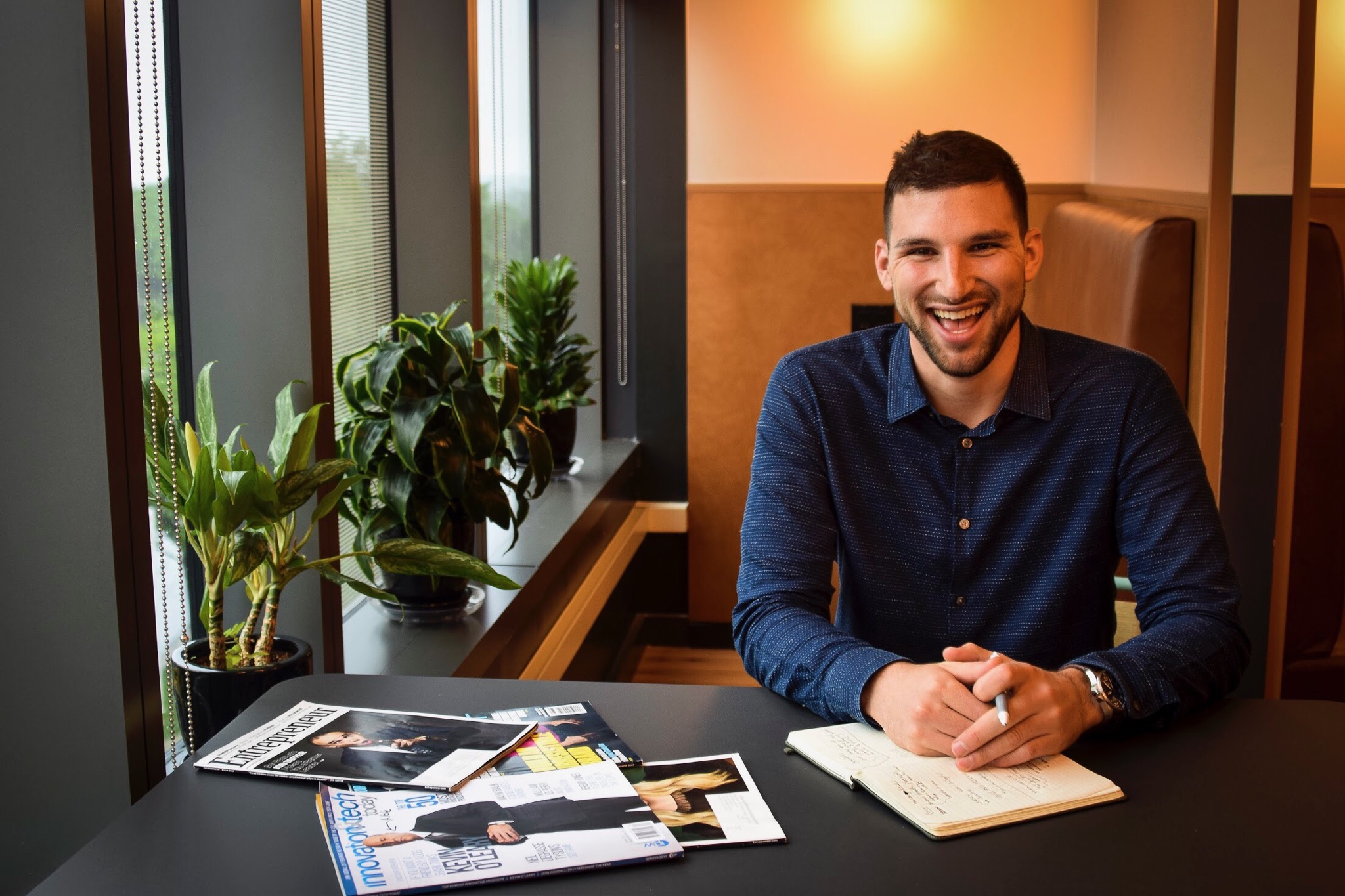There is a perceived pressure to start entrepreneurial ventures while young.
It’s not always enough to start a successful venture, win awards, and make millions at some point in your life anymore. Young entrepreneurs really have that ‘cherry on top’ – that proof of potential, the extra gold star – for starting something while still ‘young’ (i.e. in college, or before age 30).
So, we get it in our heads that we should begin our companies as soon as possible, while we can, because we’ll never be this young again.
Bryan Wish challenges us to rethink this narrative. More power to you if entrepreneurship is your path, of course, but when Bryan and I sat down to talk and reflect on his own journey, we found that working for others taught him the invaluable professional skills he needed during his first solo startup experience. The pressure from how we internalize the glamorized press on young entrepreneurship leads us to feel we must start our companies immediately, which often shortchanges us. We haven’t yet had enough exposure to the right frameworks to truly build a remarkable startup on our first try.
Frameworks, or as Bryan calls it, “a master’s degree.”
Bryan is a Next Gen Community member, builder, and master marketer, and has been ‘earning his master’s degree’ (figuratively speaking) over the past couple of years. He has really redefined his frame of thinking as he looks to the coming years of his career. When he graduated college, he started a company called WishDish; he knew full and well that he didn’t have experience and frankly didn’t know the industry enough to make his a sustainable business, but he learned by diving in head first. He experienced anxiety attacks without a proper long-term plan, but loved the impact his platform was making, so he kept going until he couldn’t go any further.
Isn’t this a story so many of us have lived? My first venture started when I was just 18, and like Bryan, I was learning as I went along. Truthfully, it’s courageous – especially of him, because it was how he was sustaining himself financially. But, a year and a half post-graduation, money got tight. He moved into a friend’s room, Marshall Mosher, Founder of Vestigo, where he stayed for 6 months. “Right when I moved in I thought to myself, I need to figure out how to get out of this situation,’ Bryan recalled. He was embarrassed his life had reached that point.
While he had an incredible advisory board, he felt very lonely as a solo founder and took to LinkedIn. He reached out to 30-40 people who were part of entrepreneurial communities to meet other young founders like himself. Additionally, because his startup required growing and scaling a global community from the ground up, he figured that talking with other successful community builders would yield invaluable advice and connections.
He didn’t know it would lead to a full-time job. He officially stopped working on his startup in February 2017, figuring it made more sense to accept full-time employment with another organization.
I pushed him on this. How was it that he could abandon his startup after almost two years of working on it? “I was scraping by on my funds, and had 2-3 months left of runway,” he candidly shared. “And furthermore, I had no structure to what I was doing, so I didn’t know how to be successful. So, I decided to learn from people who had done this before instead of continuing to put unhealthy pressure on myself.”
This is where Bryan had to make the distinction – some people can do it. This is not at all to discourage any young entrepreneur, especially when they have to be scrappy. He simply knew that the best choice for him was to get the experience he needed to ultimately bring the next version of WishDish to life – even if it would take two, three, or four years working elsewhere.
He was right.
Bryan reflected upon everything he learned from his experiences working for others – teachings he would not have been privy to had he remained solely focused on his own venture – and sums up a few of his top nuggets of advice below:
- Consistent Branding. “The organization I worked for was very particular about branding because they knew the type of community and member archetype they wanted to attract,” Bryan shared. “It was my first time hearing, ‘this isn’t on-brand,’ and really learning the importance of how to make things look and feel consistent.”
- How to Form a Community. Turns out, communities are built on core values and serve different people at different points in their lives. He explained, “Helping people understand why they are involved with your organization and become evangelists for your mission is vital.” While communities serve a purpose for business objectives, giving back to the community as much as you ask of them is equally important.
- How to Scale a Community. Just like he was hoping to glean advice on this very subject from his LinkedIn connections in the first place, he learned how to do it with his own boots on the ground. “I learned the course of central leadership that expands beyond yourself, and how to put in repeatable systems and processes so that all chapters, irrespective of location, worked the same on a global level.”
After Bryan finished working with this community, he stumbled upon what he now calls the perfect opportunity: coordinating and executing the marketing for Allen Gannett, CEO of TrackMaven and author of recently published book The Creative Curve. The book aligned with Bryan’s core values. He felt by helping Allen market his book effectively, it would help thousands of people who read it build their own ideas. Imagine being 24-years-old, coming off one important experience, and then having the opportunity to work under someone who really had it together. He was continuing to add skills to his toolbelt with the diversity of these experiences.
What I noticed as Bryan told me this story was how already, his experience with Allen would help him build upon all he had learned working with a team on the community side. It would help him understand how to manage his career on a personal and professional level while building marketing skills in the digital landscape.
“First of all, What made Allen a great leader was his organization. He was the best planner between his short term and long term goals,” Bryan told me. “Having structure and routine breeds so much more success than people think. Allen had everything on his calendar down to the minute, he’d send a confirmation beforehand, and every invite had a call-in number or an address to make sure there were no questions.”
But beyond simply personal organization habits, the job itself – marketing to and building an audience – was vital. “You can’t market to an audience if you don’t have one”, a message Allen instilled in Bryan from Day 1. “We spent so much time making sure that the book had great distribution and building a marketing flywheel.” It seems intuitive, but it isn’t: “I originally had great content with WishDish but no audience to distribute it to or a clear brand. I could finally appreciate marketing for what it could be.”
They knocked it out of the park. Selling thousands of copies in the first week alone, Bryan worked with Allen to land press coverage in outlets Forbes, Inc., CNBC, Thrive, Fast Comapny, Morning Brew, PRSUIT, Tedx – you name it, every major news publication seemed to share the launch.
It became clear through talking with Bryan that every career decision he made during this time was tied to his core values: helping to give people a greater voice and make meaningful connections between people.
The culmination of these once-in-a-lifetime experiences, or ‘master degrees,’ have positioned Bryan advantageously in this next phase of his life. He’s now building his own brand while helping other entrepreneurs do the same.
Central to our conversation was the oftentimes inextricable tie between an entrepreneur’s identity and their work. Oftentimes, how an entrepreneur views themselves is caught up in the success or failure of their company. This, Bryan believes, is why it’s important to have a personal brand. That way, no matter what happens to what you create, you have your brand which is untouchable. This is personal for Bryan; when he had his startup, WishDish, people saw him as simply the entrepreneur of the company rather than his own person with a ‘Bryan Wish’ personal brand. He didn’t like being defined by what he’s done as opposed to who he is. So, he’s realized how vital it is to get the brand right on a personal level before he goes for building a bigger venture.
Choosing to first work for someone else’s vision, Bryan says, was key to building himself and his brand ‘from the inside out’. And now, he knows how to build a community and market any brand he touches. And, unlike before, he has a great teacher in Allen to emulate.
“I think it’s important to say that I’m still early on the journey,” Bryan told me towards the end of our call. “I still have a long way to go until I find my North Star, but if I learn how to build a brand on my own successfully, I’ll have the confidence to take those systems to where I previously failed to something entirely new.” Seems like a smart plan, making mistakes on himself first before trying for something at a much larger scale with investor money.
Preparing ourselves for the ‘long game’ strategy, or the ‘master’s degree,’ is what can ultimately help us do more faster when we’re ready to take the plunge. But, regardless of what you choose to do and what stage of life you’re in, remember; everything you do today prepares you for what’s coming next. And at Next Gen, a community of thousands has your back.


